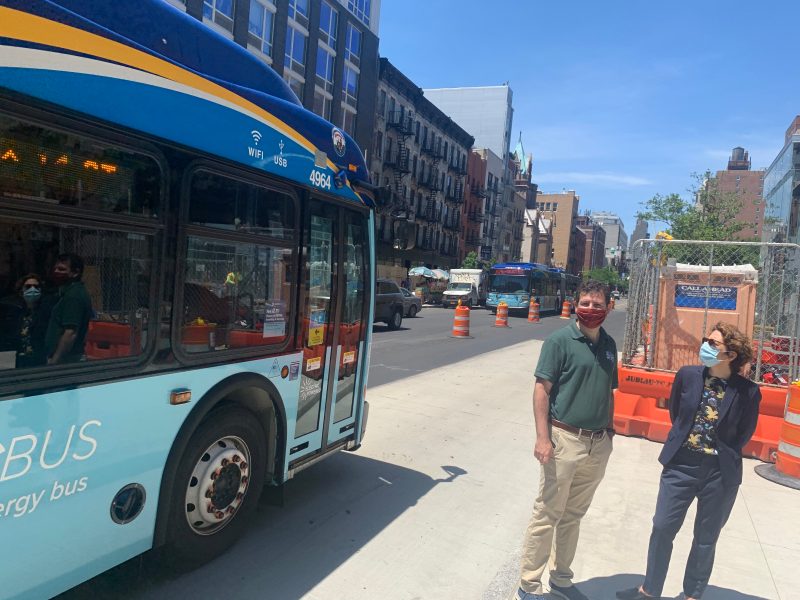Mayor Creates More Busways — And Makes 14th Street Permanently Car-Free

It’s not 60 miles, but it’s a start.
Mayor de Blasio says he’ll create 20 miles of car-free busways and dedicated bus lanes across the city, starting this month — and make the successful 14th Street busway permanent. The mileage is less than the 60 miles demanded last week by the MTA as New York City begins its Phase 1 reopening, but a significant step forward for transit.
Streetsblog asked why the mayor chose to do 20 miles instead of the 60 requested by the tri-state transit authority.
“I’m someone who likes to see progress and celebrate it and then create more,” he said, referring to the 14th Street Busway, which began last year as a pilot program. “And this is a major step. The fact that we have proven [success] on 14th Street [and] now five more coming in — it’s positive. The busways and Select Bus Service is working and it makes for a better future.”
According to City Hall, the first of the five busways will be on Main Street between Sanford and Northern Boulevard in Flushing, followed by car-free stretches of:
- Jamaica Avenue from Sutphin Boulevard to 168th Street.
- Fifth Avenue in Manhattan, from 57th to 34th streets.
- Jay Street in Brooklyn, from Fulton to Tillary streets.
- W. 181st St. in Manhattan, from Amsterdam Avenue to Broadway.
The stretches add up to 3.5 miles of car-free roadway. The Department of Transportation said it selected those stretches because they have exceptionally high bus use. The Jamaica Avenue stretch, for example, carries 225,000 rides per day. Main Street carries 150,000.
The Fifth Avenue stretch serves about 75,000 rides, but it also is a destination for buses from all five boroughs, said DOT Commissioner Polly Trottenberg.
“The MTA asked for 60 miles, but I want to point out in our best year on bus lanes, starting in April and going the whole year, we did 14 miles of bus lanes,” added Trottenberg. “So for us to get this done, starting in June for the rest of the year, 20 miles is a lot. It’s not everything, but it’s an exciting start.”
The remaining 16.5 miles of dedicated bus lane projects:
- 14th Street between First Avenue and Avenue C.
- 149th Street in the Bronx from Southern Boulevard to River Avenue.
- Merrick Boulevard in Queens from Hillside Avenue to Springfield Boulevard.
- Hylan Boulevard in Staten Island from Lincoln Avenue to Nelson Avenue.
Activists were enthused:
“This is an encouraging first step,” said Ben Fried of TransitCenter. “If DOT moves fast and these 20 miles work well, it will open up possibilities to expand the concept and get those 60 miles.”
Jaqi Cohen of the Straphangers Campaign pointed out the connection between better bus service and a healthy workforce.
“Our city’s recovery depends in large part on our transit system’s ability to function, but nowhere is this more true than on our city’s buses which provide transportation to a tremendous number of essential workers each day,” she said. “I’m encouraged [but] we still want to see the city commit to an additional 20 to 40 miles this year to meet its goal of improving bus speeds citywide 25 percent by the end of the year, and it’s more important than ever that the MTA match these efforts by improving frequency of service along these corridors.”
She added that the creation of the 14th Street busway “provided a complete transformation on a street that was previously home to the slowest buses in the city.”
Erwin Figueroa of Transportation Alternatives said he was pleased to see busways created in areas beyond Manhattan’s Central Business District.
“While all corridors mentioned today are greatly needed, Main Street, Jamaica Avenue, and 181st Street serve as important transportation corridors, for both bus riders, and as transfer points between bus riders and subway riders,” he said. “Fast, frequent, and reliable bus service will be key to provide confidence for commuters to use buses as the city continues to reopen. The next round of busways must include the Bronx and Staten Island.”





